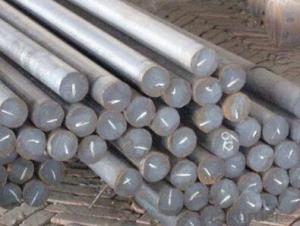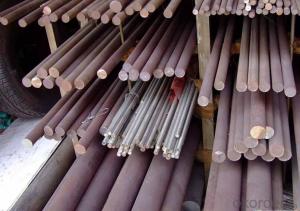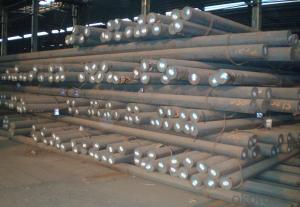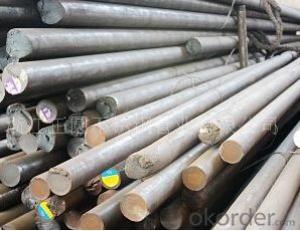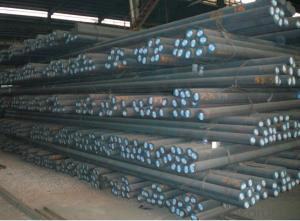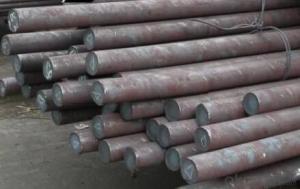Grade Q235B Round Bars-Carbon Round Bar -Alloy Round Bar
- Loading Port:
- Shanghai
- Payment Terms:
- TT OR LC
- Min Order Qty:
- 3 m.t.
- Supply Capability:
- 100000 m.t./month
OKorder Service Pledge
OKorder Financial Service
You Might Also Like
Item specifice
Grade Q235B Round Bars-Carbon Round Bar -Alloy Round Bar
Details Information of Grade Q235B Round Bars-Carbon Round Bar -Alloy Round Bar
| Name | SAE1045 Carbon Steel Round Bar |
| Shape | Round Bar/Square Bar/Flat Bar/Plate/Wire |
| Standard | GB/ASTM/SAE/AISI/DIN/JIS/EN/BS |
| Surface Treatment: | Black/Peeling/Polished/Machined |
| Delivery Condition: | Hot Rolled or Forged/Peeled or Black Surface |
| Test | SGS/UT 100% Elements Testing |
| Certificate: | ISO/Mill Certificate |
| Service: | 24 hours online service / |
| more than 20 years trading and manufacture | |
| Quality Assurance: | the third party inspection, such as SGS, BV, TUV…etc. is acceptable |
| Packaging Details: | Seaworthy Packaging or as per customer's packing instruction |
| Carbon structure round bar | Q195 Q235A Q235B 10# 20#-55# S45CB |
| Low alloy high strength round bar | Q345A/Q345C/Q345D Q345B Q345E |
| Alloy structure round bar | SAE51B20 20Cr 40Cr 40CrV 20CrMo/30CrMo/35CrMo/42CrMo 20CrMoA/30CrMoA/35CrMoA/42CrMoA/42Cr ML20CrMo/ML30CrMo/ML35CrMo/ML42CrMo B7/SCM435-440 20MnTiB 20CrMnMo 20CrMoH 42CrMoH 40MnB/40MnBH 30Mn2-40Mn2 27SiMn 50CrVA 30CrMnTi |
| Pinion steel | 20CrMnTi 20CrMnTiH 20CrMnTiHCS/20CrMnTiHLD Q20CrMnTi-1/Q20CrMnTi-2 |
| Sucker rod | 20-35CrMoA |
| Free-cutting steel | GT1215S |
| Spring steel | 60Si2MnA 65Mn |
| Ball bearing steel | GCr15 |
Chemical Composition of Grade Q235B Round Bars-Carbon Round Bar -Alloy Round Bar
| C | Si | Mn | P | S | Cr | Ni | Cu |
| 0.17-0.24 | 0.17-0.37 | 0.35-0.65 | ≤0.035 | ≤0.035 | ≤0.25 | ≤0.25 | ≤0.25 |
| Tensile strength (σb/MPa) | Yield strength (σb/MPa) | Elongation (δ5/%) |
| ≥410(42) | ≥245(25) | ≥25 |
Company Introduction of Grade Q235B Round Bars-Carbon Round Bar -Alloy Round Bar
CNBM International Corporation is the most import and export platform of CNBM group(China National Building Material Group Corporation) ,which is a state-owned enterprise, ranked in 270th of Fortune Global 500 in 2015.
With its advantages, CNBM International are mainly concentrate on Cement, Glass, Iron and Steel, Ceramics industries and devotes herself for supplying high quality series of refractories as well as technical consultancies and logistics solution.
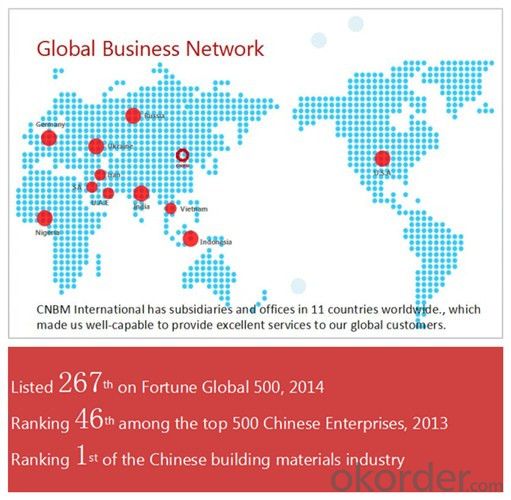
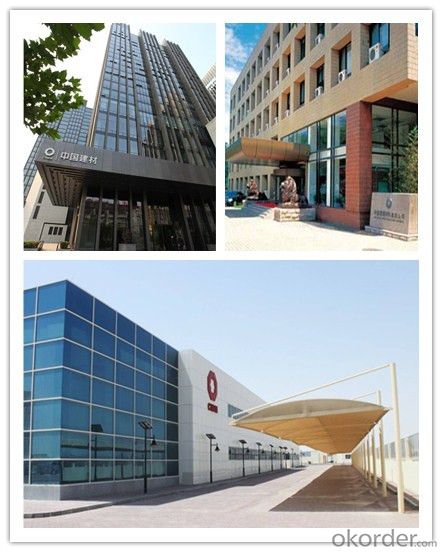
Certificates of Grade Q235B Round Bars-Carbon Round Bar -Alloy Round Bar
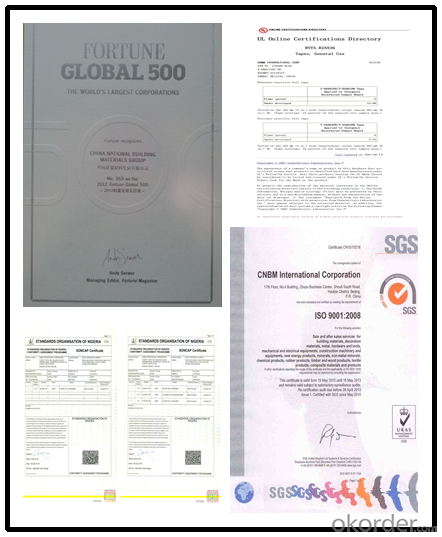
Packaging & Delivery of Grade Q235B Round Bars-Carbon Round Bar -Alloy Round Bar
Packaging Detail | Sea worthy packing /as per customer's packing instruction |
Delivery Detail | 15 ~ 40 days after receiving the deposit |
Products show of Grade Q235B Round Bars-Carbon Round Bar -Alloy Round Bar
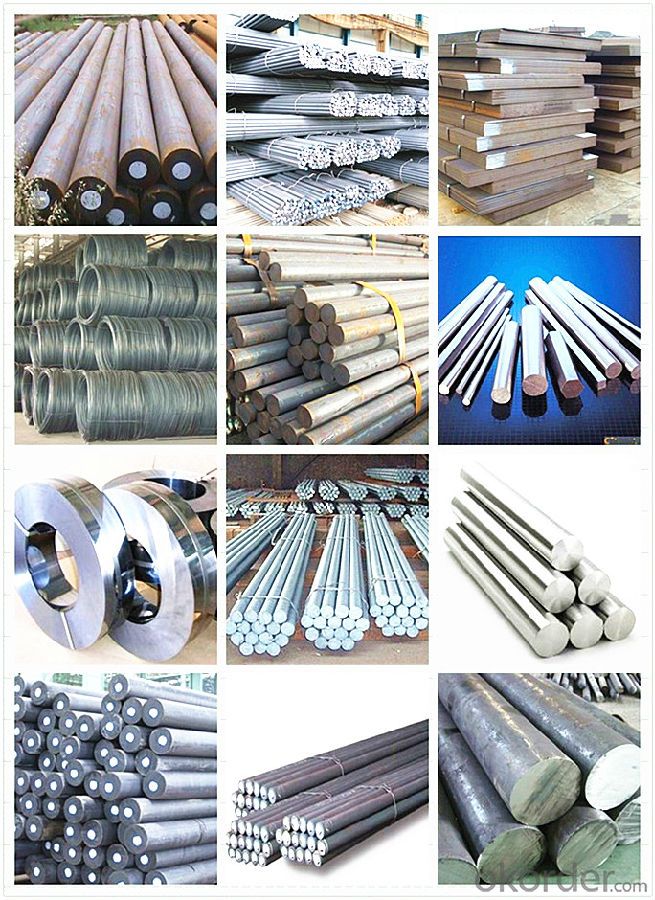
FAQ
Are you a trading company or manufacturer? | Manufacturer |
What’s the MOQ? | 3 metric ton |
What’s your delivery time? | 15-35 days after downpayment received |
Do you Accept OEM service? | Yes |
what’s your delivery terms? | FOB/CFR/CIF |
What's the Payment Terms? | 30% as deposit,70% before shipment by T/T |
Western Union acceptable for small amount. | |
L/C acceptable for large amount. | |
Scrow ,Paybal,Alipay are also ok | |
Why choose us? | Chose happens because of quality, then price, We can give you both. Additionally, we can also offer professional products inquiry, products knowledge train (for agents), smooth goods delivery, excellent customer solution proposals. |
What's your available port of Shipment? | Main Port, China |
What’s your featured services? | Our service formula: good quality+ good price+ good service=customer's trust
|
Where are your Market? | Covering more than 160 countries in the world |
- Q:What are the challenges in welding special steel?
- One of the main challenges in welding special steel is its high carbon content, which can result in increased hardness and brittleness. This requires careful control of the welding process, including preheating and post-weld heat treatment, to prevent cracking and ensure proper weld strength. Additionally, special steels often have alloying elements that can influence the weldability, such as chromium, nickel, or molybdenum, requiring specific filler materials and welding techniques. Overall, the challenges in welding special steel lie in achieving a strong and defect-free weld while maintaining the desired mechanical properties of the steel.
- Q:How does special steel meet the requirements of specific industries?
- Special steel meets the requirements of specific industries by offering superior characteristics such as high strength, corrosion resistance, heat resistance, and wear resistance. These properties make it suitable for applications in industries like automotive, aerospace, energy, and machinery, where durability, efficiency, and safety are crucial. Additionally, the versatility of special steel allows for customization and formulation of alloys that cater to specific industry needs, ensuring the desired performance and reliability in various applications.
- Q:How does special steel contribute to the manufacturing of springs for automotive applications?
- Special steel plays a crucial role in the manufacturing of springs for automotive applications due to its unique properties and characteristics. Springs are essential components in automobiles as they provide the necessary suspension and shock absorption, ensuring a smooth and comfortable ride. One of the key advantages of special steel in spring manufacturing is its high strength and durability. Springs are subject to constant stress and repetitive loading, and special steel, with its exceptional strength, can withstand these forces without deforming or breaking. This property ensures that the springs can function reliably and maintain their shape and performance over extended periods of use. Additionally, special steel offers excellent fatigue resistance, which is vital for springs in automotive applications. Fatigue occurs when a material weakens and eventually fails after repeated loading and unloading cycles. Special steel is specifically designed to withstand fatigue, allowing the springs to endure the constant pressure and stress without experiencing premature failure. Moreover, special steel provides superior corrosion resistance, which is particularly important for automotive springs. Cars are exposed to various environmental elements, including moisture, road salt, and chemicals, which can lead to corrosion and deterioration of the springs. By using special steel with enhanced corrosion resistance, manufacturers can ensure that the springs have a longer lifespan and maintain their performance even in harsh conditions. Furthermore, special steel offers versatility in terms of its composition and properties. Manufacturers can choose from a wide range of special steel alloys, each with its own unique characteristics, to meet specific requirements. For example, some alloys offer greater elasticity, allowing the springs to flex and absorb shocks more effectively. Others provide higher hardness, enhancing the springs' load-bearing capacity. This flexibility in material selection empowers manufacturers to design and produce springs that are tailored to the specific needs of automotive applications. In conclusion, special steel significantly contributes to the manufacturing of springs for automotive applications by providing high strength, durability, fatigue resistance, corrosion resistance, and versatility. These properties enable the production of reliable, long-lasting springs that ensure optimal suspension, shock absorption, and overall performance in vehicles.
- Q:What are the properties of die steel?
- Die steel, also known as tool steel, possesses various properties that make it suitable for use in die and mold-making applications. Some of the key properties of die steel include: 1. Hardness: Die steel is known for its high hardness, which helps in resisting wear, abrasion, and deformation during the manufacturing process. 2. Toughness: Die steel exhibits good toughness, enabling it to withstand higher impact and shock loads without fracturing or breaking. 3. Wear resistance: Die steel has excellent wear resistance, allowing it to maintain its shape and sharpness even when subjected to repeated contact with other materials. 4. Heat resistance: Die steel can withstand high temperatures without losing its hardness and strength, making it ideal for applications involving hot working conditions. 5. Machinability: Die steel is relatively easy to machine, allowing for the precise shaping and forming of dies and molds. 6. Corrosion resistance: Depending on the specific alloy composition, die steel can offer varying degrees of corrosion resistance, protecting it from environmental factors. Overall, the properties of die steel contribute to its ability to withstand high pressures, temperatures, and mechanical stresses, making it a preferred material for manufacturing dies and molds used in various industries.
- Q:What are the main advantages of using special steel in the marine industry?
- The main advantages of using special steel in the marine industry include its high strength and corrosion resistance, which are crucial for withstanding the harsh marine environment. Special steel also offers excellent weldability and formability, enabling the construction of complex structures and components. Additionally, its durability and long service life contribute to reduced maintenance and replacement costs.
- Q:What are the properties of duplex stainless steel?
- Duplex stainless steel possesses a combination of excellent mechanical properties, including high strength and corrosion resistance. It offers good toughness and ductility, making it suitable for a wide range of applications. Moreover, duplex stainless steel exhibits a higher resistance to stress corrosion cracking and pitting corrosion compared to other types of stainless steel. Additionally, it has a good weldability, enabling it to be easily fabricated and used in various industries such as oil and gas, chemical processing, and marine environments.
- Q:What is the impact of impurities on the properties of special steel?
- The presence of impurities in special steel can have significant impacts on its properties. Impurities can alter the steel's mechanical properties, such as strength, hardness, and toughness. They can also affect the steel's corrosion resistance and thermal conductivity. Additionally, impurities can lead to microstructural defects, such as grain boundaries or inclusions, which can further weaken the steel. Therefore, minimizing impurities is crucial in order to achieve high-quality special steel with desirable properties.
- Q:What are the properties of nitriding steel?
- Nitriding steel is a specialized process used to enhance the surface hardness and wear resistance of steel. The properties of nitriding steel include improved surface hardness, increased resistance to wear, improved fatigue strength, enhanced corrosion resistance, and reduced coefficient of friction. This process forms a hard nitride layer on the surface of the steel, making it suitable for applications in industries such as automotive, aerospace, and manufacturing, where durability and performance are crucial.
- Q:How does special steel perform in cryogenic applications?
- Special steel is renowned for its exceptional performance in cryogenic applications, characterized by extremely low temperatures that fall below -150 degrees Celsius (-238 degrees Fahrenheit). Unlike regular steel, which tends to become brittle and weaker in such conditions, special steel, also referred to as cryogenic steel or low-temperature steel, is specifically engineered to withstand these extreme cold temperatures. One of the key advantages of special steel lies in its ability to maintain its mechanical properties even at cryogenic temperatures. It retains its strength, toughness, and ductility, enabling it to endure the stresses and strains imposed on it in cryogenic environments. As a result, special steel finds application in various fields, including aerospace, energy, and healthcare, where it is used in cryogenic storage tanks, pipelines, and equipment. Another significant feature of special steel is its excellent resistance to brittle fracture at low temperatures. This is of utmost importance since brittle fractures occur when materials become excessively brittle and fail under stress. The distinct composition and processing methods employed in special steel help prevent such fractures, ensuring the integrity and safety of components within cryogenic systems. Furthermore, special steel possesses a low coefficient of thermal expansion, meaning it undergoes minimal dimensional changes when exposed to temperature fluctuations. This characteristic proves highly advantageous in cryogenic applications as it preserves the stability and reliability of equipment and structures. Additionally, special steel exhibits commendable corrosion resistance, which is vital in cryogenic environments where the presence of moisture and certain chemicals can accelerate corrosion processes. By resisting corrosion, special steel enhances the longevity and durability of components, thereby reducing maintenance and replacement costs. In conclusion, special steel is the preferred choice for cryogenic applications due to its ability to maintain mechanical properties, resist brittle fracture, display low thermal expansion, and exhibit corrosion resistance. These properties render it a dependable and efficient material for use in cryogenic systems, providing the necessary strength and durability even under extremely low-temperature conditions.
- Q:How is special steel used in the aerospace sector?
- Special steel is used in the aerospace sector for various applications such as manufacturing engine components, landing gear, and structural parts. Its high strength-to-weight ratio, corrosion resistance, and ability to withstand extreme temperatures make it ideal for enhancing the performance, durability, and safety of aircraft.
1. Manufacturer Overview |
|
|---|---|
| Location | |
| Year Established | |
| Annual Output Value | |
| Main Markets | |
| Company Certifications | |
2. Manufacturer Certificates |
|
|---|---|
| a) Certification Name | |
| Range | |
| Reference | |
| Validity Period | |
3. Manufacturer Capability |
|
|---|---|
| a)Trade Capacity | |
| Nearest Port | |
| Export Percentage | |
| No.of Employees in Trade Department | |
| Language Spoken: | |
| b)Factory Information | |
| Factory Size: | |
| No. of Production Lines | |
| Contract Manufacturing | |
| Product Price Range | |
Send your message to us
Grade Q235B Round Bars-Carbon Round Bar -Alloy Round Bar
- Loading Port:
- Shanghai
- Payment Terms:
- TT OR LC
- Min Order Qty:
- 3 m.t.
- Supply Capability:
- 100000 m.t./month
OKorder Service Pledge
OKorder Financial Service
Similar products
New products
Hot products
Hot Searches
Related keywords
